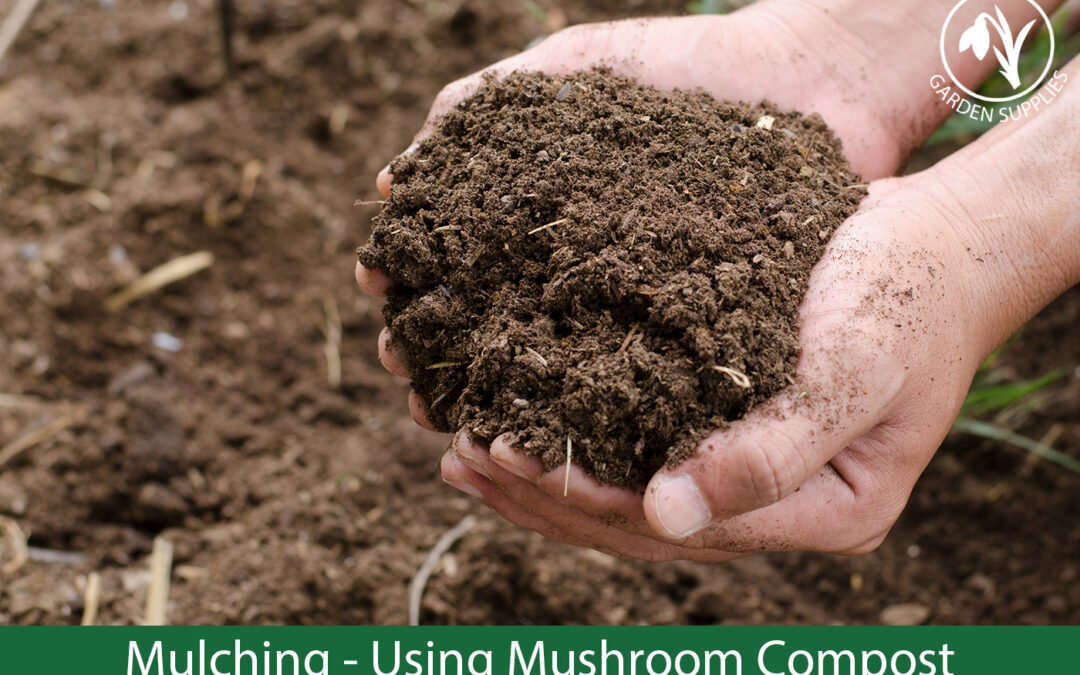At Garden Supplies, we know that a lot of people love the idea of having a nice-looking garden. But this can be difficult to achieve when faced with a patchy, mossy lawn, weeds taking over your flower beds and cold weather. Fertilizing your garden can certainly help with improving your garden’s appearance.
Mulching is a great alternative to using chemical fertilisers, helping to make your garden look tidier and suppress the growth of weeds. It can also help the soil retain more moisture meaning that it can reduce the amount of watering needed. Mulch is also particularly helpful in colder months as it helps to protect your plants’ roots from extreme temperatures. But what exactly is mulch?
Loose coverings placed over the surface of soil, mulches can either be applied to bare soil, or cover the top of compost in containers. As well as farmyard manure and bark, mushroom compost can be a great choice for when you are mulching and manuring your beds and borders.
What is Mushroom Compost?
Mushroom compost, made by mushroom growers, is typically produced by using an organic substance such as straw, hay or corn cobs, combined with horse manure or poultry. As the mushroom growing process can vary between growers, the recipe of the compost may differ, including additions such as gypsum, peat moss or soybean meal. After the mushroom growing process is complete, the left-over compost is then sold as fertiliser.
Why Use Mushroom Compost?
A relatively inexpensive option, mushroom compost has many benefits, including its ability to retain water. This means that it can help improve the transmission of water through the soil and keep it moist. This is particularly beneficial for plants that need a lot of hydration and can be helpful to gardeners who cannot water their plants as frequently as needed.
Its high water content is also a great way to help the environment, reducing the amount of water you use on your garden. Being a by-product of mushroom growing that is recycled into a new compost, it can also help the environment further as it does not require any additional materials.
Another benefit is that mushroom compost can contain a limited amount of nitrogen. This is essential for the growth of plants and foliage. During the mushroom growing process, the mushrooms consume a lot of the nutrients, meaning that mushroom compost can act as a light fertiliser which can steadily enrich the soil, without encouraging weeds to grow.
Things to Keep in Mind
It is worth noting that mushroom compost should not be used as a replacement for soil, and instead should be used alongside it. This is because it has a high salt content which can be bad for some plants and its ability to retain water can cause waterlogged soil, subsequently leading to rotting.
It is very beneficial when added to the soil of a variety of potted plants, fruits, and vegetables, including tomatoes which can benefit from the amount of calcium present in mushroom compost.
You should also be aware that mushroom compost should be avoided when it comes to plants that don’t like a lot of water, such as succulents, as its water retaining qualities can be more problematic than helpful. It also shouldn’t be used for plants that are in pots with no drainage.
If you have any questions about mushroom compost and how to use it, you can get in touch with us and we would be happy to help! We can also help you with other mulches such as bark nuggets and pine mini chips.

